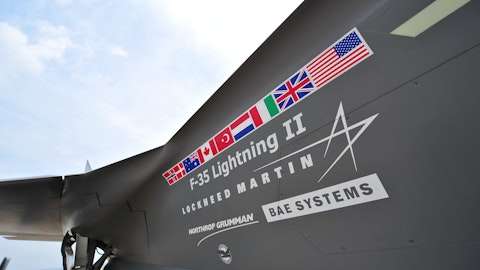For many investors, the U.S. government seems a black box. Taxes go in, spending comes out — but with the exception of the occasional headline-grabbing megacontract, where the spending goes, and how much goes to whom, remains very much a mystery.
But if you look very carefully (and know where to look), you can sometimes get a glimpse at where the money is going. Believe it or not, one of the easiest places to spy on government spending is… the U.S. Pentagon.
Lockheed Martin takes the cake
After awarding nearly $1 billion in contracts Wednesday, the Department of Defense ramped up spending once again Thursday, announcing $1.1 billion in new contracts. Defense contracting giant Lockheed Martin (NYSE:LMT), however captured almost 85% of the funds on offer with one single contract win — leaving precious money left for everyone else.
Lockheed’s big contract win, worth $920.4 million, will fund the company’s acquisition of “long lead time” parts necessary to build 94 F-35 Lightning II stealth fighter jets for U.S. and foreign buyers, including:
– 44 “standard” configuration F-35A fighters for the U.S. Air Force
– Eight more for the Royal Australian Air Force
– Six for the Royal Norwegian Air Force
– two each for the air forces of Italy and Turkey
– and 16 more for unidentified “various foreign military sales customers”
– nine short take-off/vertical landing F-35B fighters for the U.S. Marine Corps
– three F-35Bs for Britain
– and two for Italy
– and finally, two carrier-variant F-35Cs for the United States Navy.
In other news, the Pentagon awarded Raytheon (NYSE:RTN) a $17 million contract extension to continue providing support for one Joint Land Elevated Netted System (JLENS) tethered aerostat, deployed at Aberdeen Proving Ground and performing missile and aircraft early warning functions over the Washington, D.C. metro area.
Britain’s BAE Systems, meanwhile, picked up two Pentagon contracts, a $31 million award to modernize a building for the production of bomb-making materials for the U.S. Army, and a $36.6 million contract modification to perform maintenance and upgrades on the guided missile destroyer USS Kidd (DDG 100).
Insider trading notes
Over the past three months, insider trading activity at Lockheed Martin has been negative, with more sells than buys recorded, and more shares sold than bought. Insider trading of BAE, a London-listed equity, is unknown. But Raytheon is the exception.
The past three months have seen significant numbers of both insider purchases and sales at Raytheon. And while sales outnumber purchases slightly, the total number of shares sold exceeds the number of shares bought by 30,552. Incidentally, this marks a turnaround from the trend of the past 12 months, which had seen sell orders outnumber buys by nearly two-to-one, with significantly more shares sold than bought as well.
This $19 trillion industry could destroy the Internet
One bleeding-edge technology is about to put the World Wide Web to bed. And if you act quickly, you could be among the savvy investors who enjoy the profits from this stunning change. Experts are calling it the single largest business opportunity in the history of capitalism… The Economist is calling it “transformative”… But you’ll probably just call it “how I made my millions.” Don’t be too late to the party — click here for one stock to own when the Web goes dark.




